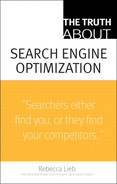Several years ago, a friend of mine directed an award-winning documentary film. He paid a guy he’d found on Craigslist to build a website to publicize his project—the film, festivals it played in, his own credentials as a director, and the awards he’d won. My friend had never heard of SEO. He just wanted the site built. The topic of ranking never came up in his conversations with his web guy. The website’s background color was white. And on that white background, in white text invisible to the eye, but clear as day to search engine spiders, was the name of the film repeated over, and over, and over again. My guess is the person who built the site had heard of SEO, but knew precious little about it. He was only trying to help. Instead, he came perilously close to getting the site reported to Google as spam and banned altogether.
This is an extreme example of keyword stuffing (not to mention a textbook case of designing a site for search engines rather than end users). It was also a pretty common SEO tactic back in the mid ‘90s. So common, in fact, that it lead search engines to develop penalties for sites that crammed a ridiculous number of keywords and phrases into website page content and meta tags. Yet people still do it, either by writing copy that repeats keywords so often that the text could not possibly have been designed for actual readers, or by including invisible, and often irrelevant, terms on pages for terms that are frequently searched, such as “sex” or “poker”. In the latter instance, these online publishers are trying to drive content to ad-supported pages with popular search terms.
Search engines have developed ways to detect invisible text, whether the white-on-white example cited previously, or text hidden “behind” an image, for example, or buried in CSS coding. Their algorithms have developed to interpret thematic and related ideas and concepts. So if there’s 1,500 words of copy on a web page, 1 200 of which are keywords and phrases, that page—and potentially the entire website—will be penalized in search rankings, and potentially even banned from showing up in search results at all. If you’re writing real copy for real human readers, this isn’t something to lose sleep over, but as a general rule of thumb, keywords and phrases should comprise roughly four to eight percent of copy on any given page.
Keyword stuffing is only the tip of the search engine spam iceberg. Tim Mayer, director of product management for Yahoo! Search, says Yahoo! defines spam as “pages created deliberately to trick the search engine into offering inappropriate, redundant, or poor-quality search results”. That’s not far off from how the other search engines define the problem, and all offer links to report instances of abuse on their respective sites.
Shari Thurow, an expert in search engine marketing, has identified more than 16 types of search engine spam, or ways people attempt to “fool” the search engines in their quest for optimization. These include the following:
• Keywords unrelated to the site
• Sneaky page redirects
• Keyword stuffing
• Mirror/duplicate content
• Tiny text
• Doorway pages
• Link farms
• Cloaking
• Keyword stacking
• Gibberish
• Hidden text
• Domain spam
• Hidden links
• Mini/micro-sites
• Page swapping (bait and switch)
• Typo spam and cyber-squatting
The lesson in here for you? Simple. Don’t spam the search engines. Ensure that you—or whomever is responsible for building, maintaining, and optimizing your websites—plays by the rules. Google’s Webmaster Guidelines are the gold standard in this area.
And if you outsource SEO? Don’t be afraid to ask questions, and to clearly state your expectations. Don’t forget that search engines are not public utilities, and are by no means obligated to include you in search results if they don’t like what you’re doing, or if you go out of your way to try to get around their rules and regulations. You can drop precipitously in organic rankings, or drop out of site altogether by being banned from the organic listings.
That’s when your headaches will really begin, as explained in the next truth.
